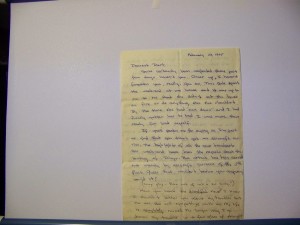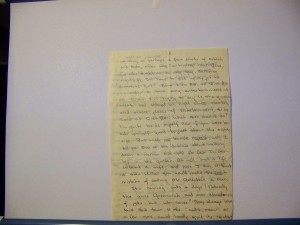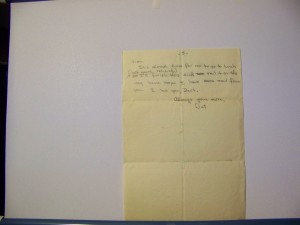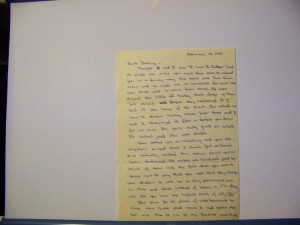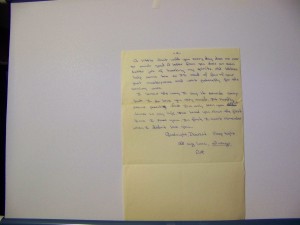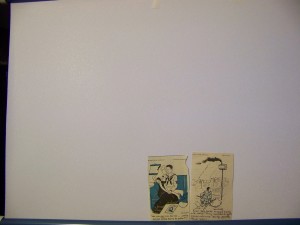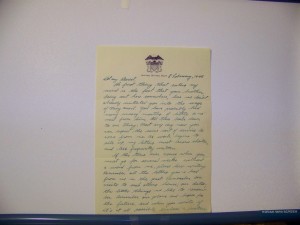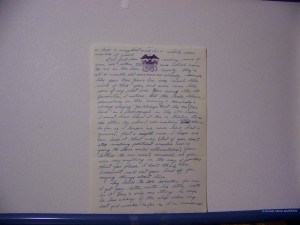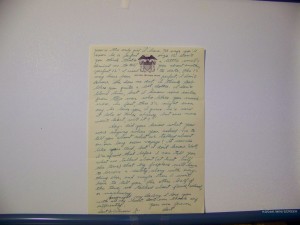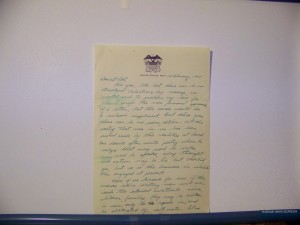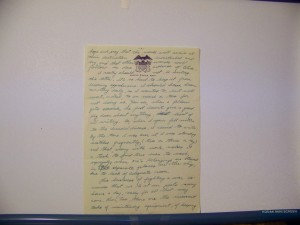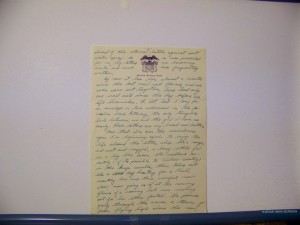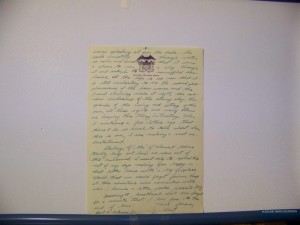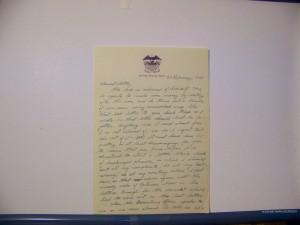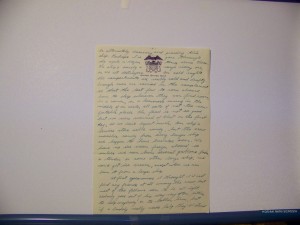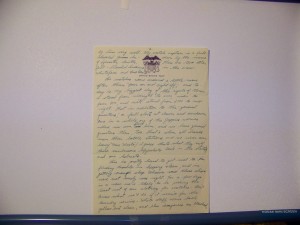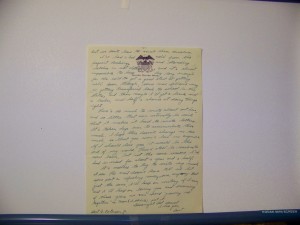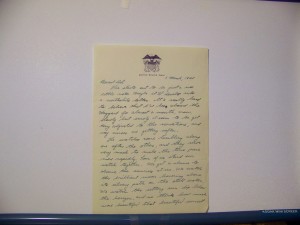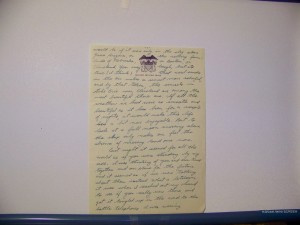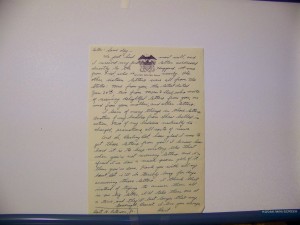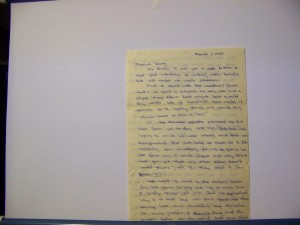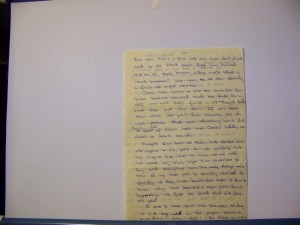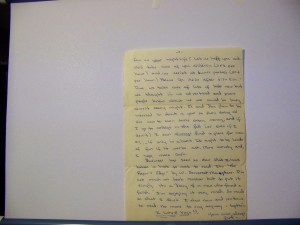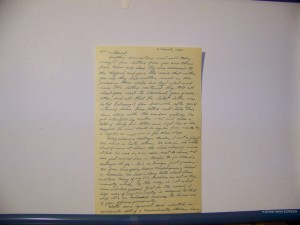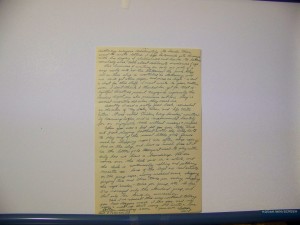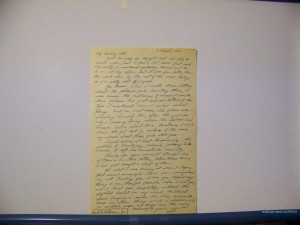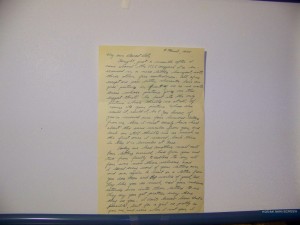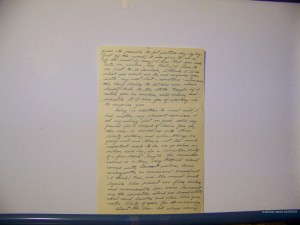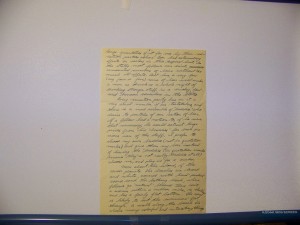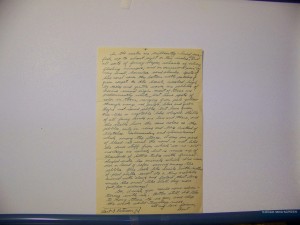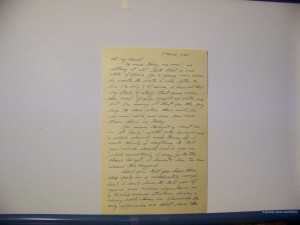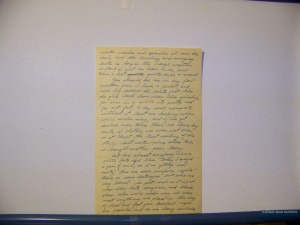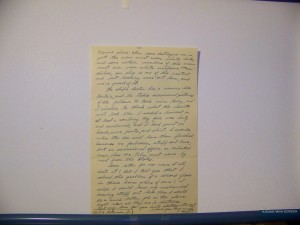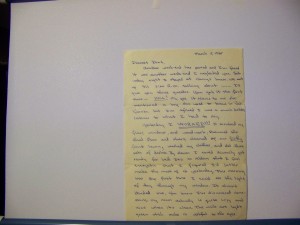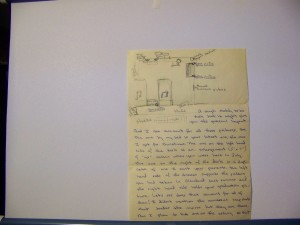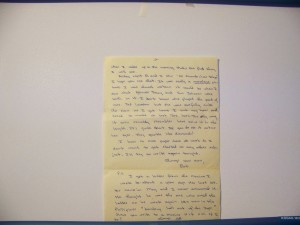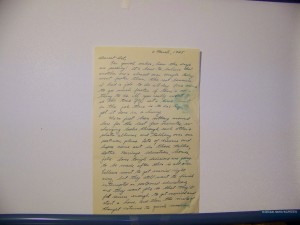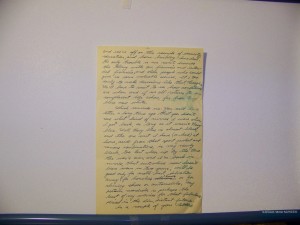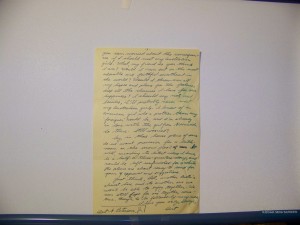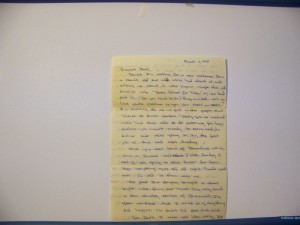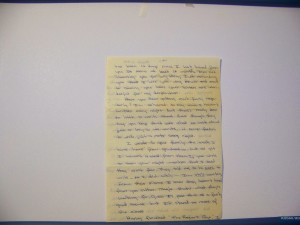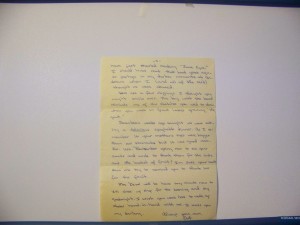This letter from Dart is part “day-in-the-life” stuff, part nostalgia for simpler, safer times, a couple of bits about food, and some lovely thoughts about Dot.
He’s in a cheerful, not-too-romantic mood, but that’s a big improvement from the “drastically blue and disheartening” moods of some recent letters. He hopes he’s not disappointed her too much with his gloomy letters of late. It’s my belief that a young man risking his life to preserve freedom across the globe is entitled to express whatever mood he’s feeling. I suspect Dot may feel the same way. I doubt she was too disappointed by his recent letters.
He tells about the big, fast, dizzying adventures he’s been having. Lots of thrills, but not the kind people would willingly pay money to experience. The thrill of being slammed against the steel walls of the ship as it makes its rough way through raging seas; the thrill of being perpetually soaked to the skin with salt water and having to work in drenched, water-laden clothes. It’s the thrill of having your life in “real, wet, turbulent danger.” He only hopes his memory of such thrills will be short when this whole thing is over.
“Ah, but when the going is pleasant and the ship cuts the still water without trying to shake the human parasites off her back; when the wake and the bow waves glow green with the weird phosphorescence of the sea at night; when we can jump rope during the daytime watches on deck; that’s when all the discomfort of the rougher days is partly forgotten. It’s almost likeable then.”
He reports about the famous “battle breakfasts” the Navy serves on days when they expect to engage the enemy. A huge spread of pancakes, sausage, eggs, fruit, toast, etc. Dart’s first came quickly on the heels of his bout with seasickness, and had he been able to keep it where it belonged, he declares it would have had “amazing possibilities.” See how stealthily he mentions that he’s experienced combat?
The ship has a few radio speakers scattered throughout, in addition to the PA speakers. Often, there’s familiar music from home piped over the speakers. They even get recorded versions of the live radio programs from the States, played one week after their original broadcast. Dart sounds like an old man when he contrasts the high school kids who need a constant stream of new music to keep them interested with the men on the ship who prefer the “old standards,” the tunes that were popular before they left home to fight a war. Dart can’t get enough of Raymond Scott, Glenn Miller, Woody Herman and Fred Waring.
Some of the guys on the ship have the region of their bunks plastered with exquisite examples of pin-up art. “Unbelievably exquisite-looking females, in languorous and entirely unnatural poses designed to stimulate the imagination without leaving very much for the imagination to conjure up.” He appreciates that their colorful presence breaks up the stark whiteness of the ship’s walls and that they are nice to look at, but he prefers a real, live girl that he can dream of holding in his arms. He prefers to gaze at the pictures of his girl – the one who defines beauty for him – and dream of their real future together.
He claims that even though the food on the Haggard is not great, it’s generally edible. Most of the guys report having gained a few pounds. But not Dart. “I’ll never gain weight. I couldn’t do it on a diet of cream puffs, malteds and thyroid extract. Oh, why did I mention cream puffs and malteds? They belong in the category of ‘lesser dreams of past and future,’ along with juicy hamburgers, french fries and Cokes , ‘Dagwood’ sandwiches, football games and dances in the fall.” He also recalls once again the time Dot sat in his dirty workshop and helped him get his little engine running. Another man might have meant that last part as sly reference to some hanky-panky, but for Dart, the real delight was that she literally helped him get his little model engine running.
In case she needs reminding, he tells her that he loves her very much, then signs off for dinner.
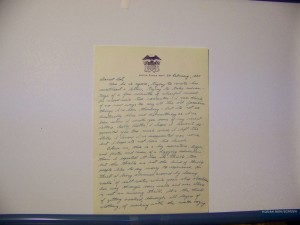
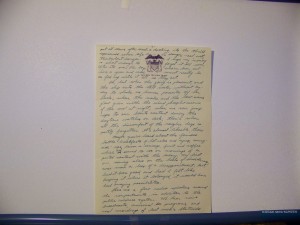
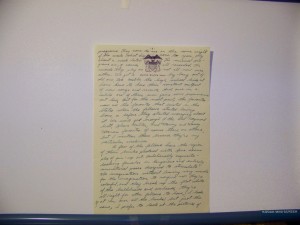
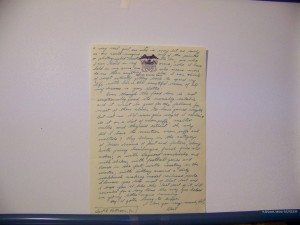
Dot writes two letters today – the first newsy and a little goofy; the second one uncharacteristically romantic.
Dot’s had to neglect Dart for a few days because Toni Gale spent the weekend at the Chamberlain house and it was Dot’s job to make sure she didn’t burn the house down. By the tithe tot had “wound down,” Dot was ready to collapse into bed.
All the newscasts this weekend have been about the bombing of Tokyo. It seems to Dot that it involved primarily aircraft carriers of the 5th fleet, so she assumes Dart had no part in it. In truth, the carriers were always the “media darlings,” garnering lots of film footage and attention. Still, those big ships didn’t go anywhere alone. It took lots of lesser vessels to support these floating cities. I recall Dad telling stories of the Haggard’s role in hovering close by as pilots returned to the deck of the carriers. If they had to ditch to avoid crashing, the crew of the Haggard was on hand to fish them out of the sea. Dart may very well have had an intimate view of the bombing of Tokyo. If so, it’s probably best that Dot remained in the dark.
She goes on for a few silly paragraphs about the new law going into effect that requires all bars, restaurants and places of entertainment to close at midnight. She makes a big deal of how much this will cramp her style and cut into her drinking time. “Whatever shall I do? I’m quite beside myself. Now, if you were beside yourself, you’d be just about the right size. But with me beside myself, well, I’ll tell you I’m a bit dubious about walking down a narrow sidewalk for fear I’ll overlap into the gutter. Oh well, such is life without a wife, and here I am without a man, unless you would make the great mistake of call Mr. Goldstein a man.”
See what I mean about goofy? I’m sure Dart got a little chuckle out of her comedy routine when he read that letter.
But she’s not done yet. “It’s raining cats and dogs. Of course, that gives Greenwich an over abundance of pets, but who cares? They’ve always said Greenwich was the cat’s meow, so a few more could hardly spoil its reputation.”
Time for Dot to go home for lunch and finish this later.
She picks up again in the evening after she and El return from having seen “I Love a Soldier.” The movie made Dot miss her sailor all the more. It touched close to her heart because the film was shot in San Francisco and made her homesick for the times she used to receive letters from there. At the beginning of a scene with the cable car, Dot told El the street on the screen was Market St. When it turned out to be so, El asked her how she knew that. “I recognized it from a sketch Dart drew once,” she replied.
It’s time for places of entertainment to close, so she thinks she better stop writing because her favorite form of entertainment is her little “chats” with Dart. “A letter from you does an even better job of boosting my spirits. Old letters help some, too, so I’ll read a few of your past masterpieces and wait patiently for the coming ones.”
She says that she loves him so much it hardly seems possible she’s seen him only eight times in her life. “I’ve loved you since the first time I saw you. In fact, I can’t remember when I didn’t love you.”
She signs off with “Goodnight, Dearest. Sleep tight. All my love, always.”
She enclosed a couple of cartoons clipped from magazines.
